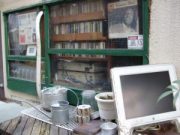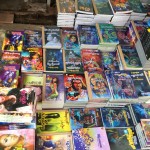
My third day in Yangon I woke up ready and raring to go, now used to the heat and the rhythm of the city. I took another morning walk around the hotel neighborhood, stopping for an early lunch then a chat at one of the many book shops scattered round the area.
I loved the long narrow book shops like the one above, though most of them had nothing in English except for some tatty Aung San Suu Kyi biographies. Not being able to read Burmese script I had to rely on just interpreting the cover art: any guesses as to what all these are about?
After my walk I scooted back to the hotel and found my taxi driver Htun Htun waiting for me. Great guy, could speak a bit of English and was happy to chat about anything and everything. He mostly took tourists or visiting businessmen around to meetings in his air-conditioned cab, working 12 hours a day most days. He has a daughter about to enter university so was ‘worried about money’ to help with her fees at Yangon University. Something about this comforted me; after all the heavy talk and thinking about post-dictatorship social transformation, hearing this common parental concern was reassuring. We’re all in the same boat, in some ways..
I arrived at the Gitameit academy shortly after lunchtime and met Ne Myo at the entrance, then moved up to the second floor to one of the practice rooms to meet U Win Maung, 76-year old master of the Burmese harp. He is one of the most famous harpists in the country and has many students, though it seems he has an ambivalent relationship with the National University..there were things about this being left unsaid and I decided not to push too deeply with my questions. Just two days in Myanmar was enough to learn that there are MANY things it’s best not to ask about.
Ne Myo and U Win Maung first performed a song called ‘Moe’ (The Rain), a 20th century song based around a much older melody. They explained that almost all Burmese traditional music has vocal accompaniment, along with a tiny hand clapper and bell.
Upon my request U Win agreed to play a short solo tune for me.
Pure magic! I once again asked as to why there was no national Burmese Music ensemble or a music center where they could perform. Ne Myo informed me that there are so few people in the country interested in promoting this kind of traditional music it makes it difficult if not impossible to put together events not sponsored by the government. The old masters who are still playing do teach as much as they can, and Ne Myo has been doing an archiving project on and off around the country, recording traditional musicians to ensure future students can learn from them. The obstacles are huge though, as Ne Myo explains:
“There are very few people in Burma who have archiving skills. Old instruments and recordings require a lot of care, and in this country the weather is very hot then very humid; it causes damage. I visited the national broadcasting archives and they had hundreds of old Burmese records dating back from as early as the 1920s. But the records are just scattered in a back room with no one looking after them, slowly being left to rot. It’s frustrating. So I am recording musicians when I can and then digitizing so we can preserve at least some of this music.”
This was extremely depressing to hear; I gained a lot of respect for what Ne Myo and the people at Gitameit Music Center academy are trying to do. Myanmar faces so many social, economic and infrastructure challenges that on some level I can understand putting music slightly on the back burner, and yet a nation is only as rich as it’s culture; losing any more than has already been lost over the last five decades would be a further tragedy.
U Win Maung, Ne Myo and I strolled over to the local tea shop for a drink and chat after they finished playing.
 The boy serving us couldn’t have been older than 11 or 12, and I then noticed all of the wait staff were young children. Ne Myo informed me they were all from northern states far from the cities, and had come to find work. ‘I know this is sometimes difficult for foreign visitors to see but you know if they don’t work, they don’t eat. Most won’t ever attend school’ Sometimes it’s as simple as that, I guess? The kids were quite amused by my presence and I caught them all sneaking looks at me, pointing and smiling. I fell in love with them instantly and wished I could have funded school fees for them all.
The boy serving us couldn’t have been older than 11 or 12, and I then noticed all of the wait staff were young children. Ne Myo informed me they were all from northern states far from the cities, and had come to find work. ‘I know this is sometimes difficult for foreign visitors to see but you know if they don’t work, they don’t eat. Most won’t ever attend school’ Sometimes it’s as simple as that, I guess? The kids were quite amused by my presence and I caught them all sneaking looks at me, pointing and smiling. I fell in love with them instantly and wished I could have funded school fees for them all.
We finished our tea saying goodbye to U Win Maung, then hopped on a bus to a local shopping center to visit a small CD shop. The buses in Myanmar, especially in the outskirts, are all like this:
Fun for a short ride but I can’t imagine taking an hour long commute in one of these. Almost all the buses have either Japanese or Korean script on the side; I was told they had imported old buses from both countries over the last thirty years and kept them running long past their use-by date.
The shopping center was as expected; fast food, clothing shops and a supermarket, with a small CD shop towards the back.
 The main rack was almost all western Pop, all priced about US$2. There was less Asian pop than I had expected based on what I had been hearing in the streets, and unfortunately only a handful of Burmese classical music or rock CDs, all of which I snapped up. The staff seemed to be all teenagers, very ‘trendy’ looking hairstyles, tattoos, etc. They apologized but said firmly ‘No Pictures, please’.
The main rack was almost all western Pop, all priced about US$2. There was less Asian pop than I had expected based on what I had been hearing in the streets, and unfortunately only a handful of Burmese classical music or rock CDs, all of which I snapped up. The staff seemed to be all teenagers, very ‘trendy’ looking hairstyles, tattoos, etc. They apologized but said firmly ‘No Pictures, please’.
This was the first music shop I had been inside of that was selling ‘regular’ CDs. The ones downtown were all selling singalong-karaoke DVDs for the most part; I was told these are by far the biggest sellers and that there is little to no demand for any type of classical music. Oh well. As to the Burmese classical and rock CDs I bought..more on that later!
I made my way back to the hotel for an afternoon nap, then decided to be a tourist again and walk through downtown to have a look at the old Strand hotel near the river. I went east down Anawratha Road, a lively walk by any standards.
This kind of urban environment has always excited me. I could happily wander up and down crowded streets like this for hours, checking out the shops, talking to the street vendors, hopping on and off the bus. I wonder how much Downtown Yangon will change by next year when I visit again? Already there are two large deluxe hotels being built. But who benefits from these? The people here deserve more than to become the latest fodder for venture/vulture capitalists..
Coming down near the Strand I saw this out the corner of my eye:
 Wish I had more time to contact the Guitar Hero to do an interview! Next time for certain.
Wish I had more time to contact the Guitar Hero to do an interview! Next time for certain.
The Strand hotel had been fully renovated after falling into disrepair for a couple of decades. It’s lovely in that old colonial way but certainly not somewhere I’d ever stay in. The lobby bar was as I’d expected, quiet and ‘sophisticated’. As I tucked into an ice cold Myanmar Beer my mind wandered..what if I suddenly woke up and it was the early 1930s? Would the Strand be full of English traders and military men like the Major in The Third Man? What was life like for the locals under British rule? Old Rangoon was known for being so cosmopolitan and prosperous, a hive of business. It was a colony, but could it have been as bad as the military-rule of the last fifty years? Is it better to be oppressed by your own or by outsiders…? I lingered over the 630ml bottle of beer thinking all these random things, trying to still understand this country.  I finished up at the Strand and walked several blocks north, looking for a place called 7th Joint Bar & Grill, Yangon’s only reggae bar. The directions said the corner of 47th & Mahanbadula Rd but there was no sign of any bar, reggae or otherwise at that intersection…up and down, up and down I walked and didn’t find the bar anywhere..then the effect of the 630ml bottle of Myanmar beer hit with a ferocious urgency, and not being Tokyo, there was no Family Mart or train station bathroom only seconds away. Thank the gods that I turned a corner and discovered the Yokozuna Ramen Shop
I finished up at the Strand and walked several blocks north, looking for a place called 7th Joint Bar & Grill, Yangon’s only reggae bar. The directions said the corner of 47th & Mahanbadula Rd but there was no sign of any bar, reggae or otherwise at that intersection…up and down, up and down I walked and didn’t find the bar anywhere..then the effect of the 630ml bottle of Myanmar beer hit with a ferocious urgency, and not being Tokyo, there was no Family Mart or train station bathroom only seconds away. Thank the gods that I turned a corner and discovered the Yokozuna Ramen Shop
The restaurant was not open yet but the owner, a Burmese who spent 13 years living in Japan, very kindly let me use the bathroom. We chatted for about 10 minutes in Japanese about his new restaurant and his import/export business dealing with Japan. I then asked him if he had ever heard of a nearby reggae bar that was not where it was supposed to be..he smiled and said ‘Sure, it’s right across the street, see that yellow lamp at the entrance to an alleyway? The bar is right down there.’ But the website said it was on the intersection not down an alley…
I thanked him, promising to keep in touch, then crossed the road and turned right at the yellow lamp and went down the alley into the 7th Joint.
 Wonderful place, playing some real roots reggae when I walked in. But where were the customers? I grabbed a seat at the bar and after ordering jerk chicken and a beer, asked the bar staff why it was so quiet. In very simple English they said live music and DJs were Thur/Fri/Sat. Sunday nights they are open but the owners are not there and it’s very quiet. Shame I missed the events and the chance to learn more about the owner’s interest in Jamaica. A reggae bar was really one of the last places I would have expected to find in Yangon; hope that there will be some more music joints like this when I return.
Wonderful place, playing some real roots reggae when I walked in. But where were the customers? I grabbed a seat at the bar and after ordering jerk chicken and a beer, asked the bar staff why it was so quiet. In very simple English they said live music and DJs were Thur/Fri/Sat. Sunday nights they are open but the owners are not there and it’s very quiet. Shame I missed the events and the chance to learn more about the owner’s interest in Jamaica. A reggae bar was really one of the last places I would have expected to find in Yangon; hope that there will be some more music joints like this when I return.
I finished up my meal and beer and took the long stroll back to the hotel at about 9:30. Only one more day left in Yangon but it would be a busy one as was scheduled to meet three people starting early in the morning, best to cut off the beer intake and get some slumber. I was already starting to feel sad about having to leave..why is traveling so damn fun??
Coming in Part Four: Burmese piano master, Hip-Hop Taxis, Slide Guitars, out of tune singing and more. See here for Days One and Two.
















